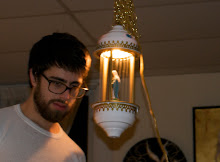Prelude
In Aldous Huxley's The Doors of Perception, the author takes mescalin under supervision to see what it would do to his brain. It leads him to requote Pascal:
"The sum of evil," Pascal remarked, would be much diminished if men could only sit quietly in their rooms.
When I read Doors, it is unexpected. Living in a rented, furnished house in Rockport, Mass., N and I are lounging like tabby cats on a Sunday afternoon. I scan the owner's bookshelf and land on Huxley, settle down on the floor next to the record player, strap on big headphones, and listen to the following fugues:
1. Space 2001: A Space Odyssey (soundtrack)
2. Days of Future Passed (The Moody Blues)
3. Ben Hur (soundtrack)
4. Four Polonaises (Chopin)
I am unfamiliar with each record, and by the time I finish with Chopin, I've finished Doors. A series of new, disparate sounds clamoring for space in the canals of my brain. Despite the long periods of voiceless sound, I am filled with voices that are, somehow, also shapes--a talking geometry that makes my organs itch.
Fugue
is discussed as: voices; textures; a form of composition; a strict discipline described as boring, laborious; borne out of improvisation and thus the basis of idea; contrapuntal, or, "point against point"--things that appear as opposite, independent, but when paired, create something complex, inexorably human.
Postlude
There is great space in minimalism, but when I cram my mind full of expansive, voiceless music, my first instinct is to write something down. I do not become the voice the music has left out, but just one that falls out of a cloud, trying to gather to the biggest drop I can before hitting the sidewalk, or, perhaps, striking an animal's tongue just as it gathers a whoop--silence a liquid in search of a voice.


No comments:
Post a Comment